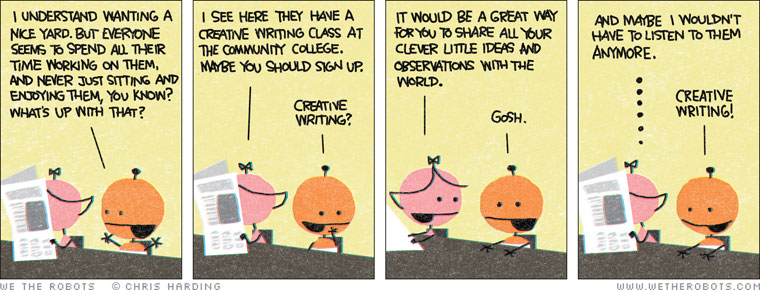
In a recent blog (113, "Don't think about building a wall. Think about laying one brick perfectly", 10 October 2014) I wrote about some of my experiences in an eight week Creative Writing Workshop that I took part in during 2004. In this blog, drawn from work completed in 2004, I reflect some more on creative writing and explore my growing understanding of the psychology of being ‘a writer’.
(1) The self-conscious eye
I was acutely self-conscious at the outset of that workshop. This was betrayed in the dry factual emphasis of my initial classroom contributions where I presented pieces of Spartan brevity and a minimum of personal disclosure. Throughout the workshop we were encouraged to focus on the more dramatic and traumatic events in our lives and to write out of those experiences, however painful they might be to recall. I avoided this in the early stages, preferring to shadow box, to play facetious word games, to imitate, mimic and show off, refusing to carve close to the emotional bone of my life. Even facetious word games and cryptic statements, however, can come back to bite you.*

(2) The critical voice
I had always wondered why artists returned to the same subject over and over. Now I know. What I produce is never up to scratch, never the perfect artefact I have in mind at the outset. Even if I only have a vague idea of what I hope to end up with, it’s always better than the final result. And there never is a final result. Nothing is ever finished. Not in the sense that it can’t be improved.
I had always wondered why artists returned to the same subject over and over. Now I know. What I produce is never up to scratch, never the perfect artefact I have in mind at the outset. Even if I only have a vague idea of what I hope to end up with, it’s always better than the final result. And there never is a final result. Nothing is ever finished. Not in the sense that it can’t be improved.
Big revisions, little revisions, always revisions. To the point where I don’t know if I’m making a piece or a poem better or worse. Writing is for perfectionists, for masochists. I go for a walk to clear my head, down to the beach, along to the Milford Marina and back, sit staring at the sea. In the course of forty minutes I decide to change a single word in the manuscript I’m working on. The next day I read it through again and put back the original word. Twenty, thirty drafts. If you know it’s never finished, how do you know when it’s time to let go?
I have adopted a two-test strategy for letting go. The first is an irritation test. If I can read a piece through without irritation, without the feeling that something is not right – a word, a phrase, a transition in the narrative – then I consider it complete, for the time being at least. No longer waking up early in the morning thinking about it usually marks this phase. The second is the test of abandonment and rediscovery. I put the piece aside for a month or more, sufficient time for me to have lost interest in it and moved on to something else. Then I read it again. This provokes two possible reactions; either, “God, this is awful. How could I have written such crap?” or, “Did I write that? It’s not bad… in fact, I think it’s quite good.”
Supposing a piece passes the censor of the critical voice in my head to the point of ‘quite good’, then what? Self conscious and technically flawed, how is anything to ever be let go to a wider audience? Here I have taken encouragement from the words of ‘real’ writers who have felt equally ambivalent about letting their work go into a wider domain. I was amazed to find, for example, that Elizabeth Barrett Browning, at some time or other in the composition of her Sonnets from the Portuguese (written in 1845/6 and published in 1850), had wanted to destroy each and every one of them. She wrote:
What no mere critic sees but what you, as an artist, know, is the difference between the thing desired and the thing attained, between the idea in the writer’s mind and the image in his work – the great chasm between the thing I say, and the thing I would say, would be quite dispiriting to me – if the desire did not master the despondency.
Erica Jong found ending and letting go of her work a major difficulty and often wanted to take her books back from the printers and editors. In Fear of Fifty (1994) she describes writers as doubters, compulsives, self-flagellants… and conquerors of fears, even the fear of fame:
“What if it’s not successful?"
“What’s that to do with you? You’re the writer, not the critic of your book.”
"What if I can’t do it?”
“You can. You know you can conquer your fears. That’s what a writer is - a conqueror of fears.”
Anne Sexton wrote to her:
Don’t dwell on the book’s reception. The point is to get on with it – you have a life’s work ahead of you – no point in dallying around waiting for approval… You have the gift – and with it comes responsibility – you mustn't neglect or be mean to that gift – you must let it do its work. It has more rights than the ego that wants approval.**
But it’s not just the inner and outer critics that are so inhibiting to a would-be writer. There’s family and friends to consider. Perhaps my much-vaunted creative freedom, like the mythical independence of the self-employed, is illusory. There are many constraints upon creative freedom in addition to the critical constraint of a lack of imagination. Self-censorship in fear of offending family and friends is the one that gives me greatest concern. Dilemmas. If I’m to take inspiration in my writing from the ‘close to the emotional marrow’ experiences in my life, will it not be transparent to all who know me who and what I am writing about? Will they care? Am I merely projecting an innate conservatism and risk aversion or responding to a genuine desire not to hurt those I love? Do I care so much about what others think? About what I imagine they think? Is ‘publish and be damned’ the only advice a writer should adopt?
It is as if the genie in the private bottle – the creative freedom I currently [2004] enjoy, a freedom that flows from complete lack of responsibility to a known or imaginary readership – is immediately compromised when the bottle is opened. For the present I can write what I like without the constraints faced by ‘real’ writers. I can ignore ethical and moral issues and conceptions of public good taste. I can ignore the artistic conventions of composition and genre. Most of all, since I have no need to make a living from writing, I can ignore the commodity status of literature and the demands imposed by writing for ‘the market’. These are luxuries not necessarily enjoyed by the ‘real’ writer. The ‘real’ writer is free to transgress all these domains, but at what cost? The cost of publication? Yet it is publication that validates the status of ‘writer’ in the first place.***Hypothetical questions in 2004 but issues that now give me cause for reflection in putting my scribbles into the public domain.
_________________________________________________________
* Authors are much given to cryptic statements and aphorisms offering up their genius to posterity. Like footnotes, these throwaway phrases have connotations of insight and insightfulness. It’s strange to think that the late Douglas Adams, the author of The Hitchhiker’s Guide to the Galaxy, will be immortalised for the notion that the meaning of life, the answer to the riddle of the universe, is the number 42. He became heartily sick of the idea. ‘After twenty years of active service,’ he wrote when introducing his website forums in 1998, ‘I am officially retiring from the job of explaining what I meant by 42. It was just a joke.’
** From Sexton, L.G. and Ames, L., Anne Sexton: A self portrait in letters (1977), cited in Amabile, Teresa M. (1996), Creativity in Context. My thanks to Lucy for sending me this encouraging quote back in March 2002 when I was contemplating giving up my day job.
*** Though not always in the writer’s eyes. The Listener of June 26 2004 had an interview with D B C Pierre who won the 2003 Man Booker prize for his first novel, Vernon God Little. The prize, he feels, gave him permission ‘to keep writing, to go as far as I can. See if I can become a real writer…’ But how long does that take?
_______________________________________________________
Previous Blogs related to Creative Writing.
12, 30 November 2011, Words of Wisdom for Creative Writers.
27, 20 January 2012, Blogging: Where the Truth Lies.
28, 24 January 2012, Self Portrait of a Clever Dick.
113, 10th October 2014, "Don't think about building a wall. Think about laying one brick perfectly."
115, 24th October 2014, Thinking about Thinking.
Short Stories.
15, 8 December 2011, Mr. Oliphant's Tears: A Love Story (2004).
36, 23 February 2012, "And There the Antic Sits" - Cameron Gunn's Nightmare.
39, 10 March 2012, "Soup for One." A very short story.
57, 16 May 2013, Francine. A Short Story.
64, 11 September 2013, The Hanging Clown: A Story for 9/11.
117. 27 November 2014, Chatlines.
_______________________________________________________
Previous Blogs related to Creative Writing.
12, 30 November 2011, Words of Wisdom for Creative Writers.
27, 20 January 2012, Blogging: Where the Truth Lies.
28, 24 January 2012, Self Portrait of a Clever Dick.
113, 10th October 2014, "Don't think about building a wall. Think about laying one brick perfectly."
115, 24th October 2014, Thinking about Thinking.
Short Stories.
15, 8 December 2011, Mr. Oliphant's Tears: A Love Story (2004).
36, 23 February 2012, "And There the Antic Sits" - Cameron Gunn's Nightmare.
39, 10 March 2012, "Soup for One." A very short story.
57, 16 May 2013, Francine. A Short Story.
64, 11 September 2013, The Hanging Clown: A Story for 9/11.
117. 27 November 2014, Chatlines.
_________________________________________________________________
ReplyDeleteI’ve been living with Parkinson’s disease for some time, and nothing I tried seemed to make a lasting difference—until I began the herbal treatment from NaturePath Herbal Clinic. I was skeptical at first, but after about four months, I started to notice real improvements. My tremors became less frequent, my stiffness reduced, and my balance and coordination gradually began to improve.
For the first time in years, I feel more in control of my body and daily life. I can move more freely, sleep better, and even enjoy simple activities again without constant discomfort. The changes have been truly uplifting—both physically and emotionally.
If you're exploring natural options for managing Parkinson’s, I genuinely recommend giving this a try. It’s been a life-changing experience for me.
Learn more at their website: www.naturepathherbalclinic.com